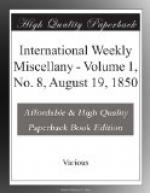Kukolnik’s “Alf and Adona,” in which at least one hundred and fifty characters are brought upon the stage, has not one whose appearance is designed to concentrate the interest of the audience. Each comes in to show himself, and goes out not to be in the way any longer. Everything is described and explained with equal minuteness, from the pile of cabbages by the wayside, to the murder of a prince; and instead of a historical action there is nothing but unconnected details. The same is the case with his “Eveline and Baillerole,” in which Cardinal Richelieu is represented as a destroyer of the aristocracy, and which also is made up of countless unconnected scenes, that in part are certainly done with some neatness. These remarks apply to the works of Iwan Wanenko and I. Boriczewski, to I. Zchewen’s “Sunshine”, five volumes strong; to the compositions of Wolkow, Czerujawski, Ulitinins, Th. Van Dim, (a pseudonym,) in fact to everything that has yet appeared.
On the part of the Imperial family, as we have already said, everything has been done for the Russian stage that could possibly be done, and is done no where else. The extremest liberality favors the artists, schools are provided in order to raise them from the domain of gross buffoonery to that of true art, the most magnificent premiums are given to the best, actors are made equal in rank to officers of state, they are held only to twenty-five years’ service, reckoning from their debut,—and finally, they receive for the rest of their lives a pension equal to their full salaries. High rewards are given to Russian star-actors, in order if possible to draw talent of every sort forth from the dry steppes of native art. The Russian actors are compelled on pain of punishment to go regularly to the German theater, with a view to their improvement, and in order to make this as effective as may be, enormous compensations attract the best German stars to St. Petersburg. And yet all this is useless, and the Russian theater is not raised above the dignity of a workshop. Only the comic side of the national character, a burlesque and droll simplicity, is admirably represented by actors whose skill and the scope of whose talents may he reckoned equal to the Germans in the same line. But in the higher walks of the drama they are worthless. The people have neither cultivation nor sentiment for serious works, while the poets to produce them, and the actors to represent them, are alike wanting.
Immediately after the submission of Poland in 1831, the theaters, permanent and itinerant, were closed. The plan was conceived of not allowing them to be reoepened until they could be occupied by Russian performers. But as the Government recovered from its first rage, this was found to be impracticable. The officers of the garrisons in Poland, however numerous, could never support Russian theaters, and besides, where were the performers to come from? In Warsaw, however, it was determined to force a theater into existence, and a Russian newspaper was already established there. The power of the Muscovites has done great things, built vast fortresses and destroyed vaster, but it could not accomplish a Russian theater at Warsaw. Even the paper died before it had attained a regular life, although it cost a great deal of money.




